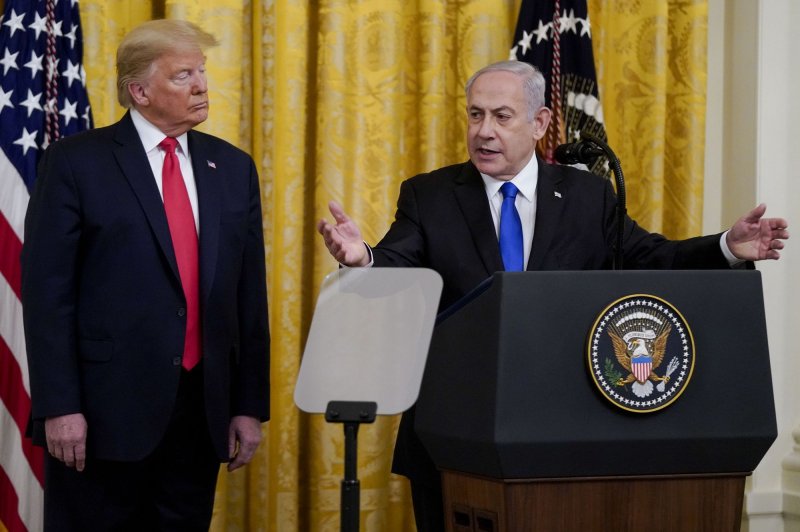1 of 9 | President Donald Trump (L) and Israeli Prime Minister Benjamin Netanyahu discuss a plan for Middle East peace in the East Room of the the White House on Tuesday. Photo by Leigh Vogel/UPI |
License Photo
Jan. 28 (UPI) -- U.S. President Donald Trump announced his long-awaited Middle East peace plan Tuesday, which proposes separate Israeli and Palestinian states and a Palestinian capital in East Jerusalem.
Trump, appearing at the White House with Israeli Prime Minister Benjamin Netanyahu, said his 80-page plan includes a map detailing the future Palestinian state and has already been agreed to by both Netanyahu and Israeli opposition leader Benny Gantz.
"Today Israel takes a big step towards peace," Trump said in making the announcement, calling the deal a "realistic" plan to solve the decades-long conflict. "I was not elected to do small things or shy away from big problems."
A key point of the agreement is the retention of Jerusalem as Israel's "undivided capital," Trump said, and full Israeli control of Jewish settlements in territory seized from the Palestinians in the Six-Day War 1967.
The future Palestinian state, meanwhile, would have its capital in portions of East Jerusalem and take over previously Israeli chunks of the West Bank. As part of the deal, Israel would agree to a four-year moratorium on building new settlements while the Palestinian state is negotiated.
Trump said the map shows "territorial sacrifices that Israel is willing to make for peace" and more than twice the land Palestinians have now.
"No Palestinians will be uprooted from their homes," he said.
The plan, however, is still subject to Palestinian approval. Administration officials said they're hopeful the plan will eventually receive it. The last Israeli-Palestinian peace talks broke off in 2014.
"We are not here to lecture -- we are not here to tell other people how to live, what to do, who to be, or how to worship," Trump added. "Instead, we are here to offer partnership -- based on shared interests and values -- to pursue a better future for us all."
Although Israel would maintain control of Jerusalem under the proposal, it has agreed to work with neighboring Jordan to ensure its Al-Aqsa Mosque will always be open to any Muslim wishing to pray there.
"Mr. President, I believe that down the decades and perhaps down the centuries, we will remember January 28, 2020," Netanyahu told Trump following the announcement. "Because on this day, you became the first world leader to recognize Israel's sovereignty over areas ... that are vital to our security and central to our heritage.
"On this day, you chartered a brilliant future for Israelis, Palestinians and the region by presenting a realistic path to durable peace."
Palestinian leaders, who did not participate in the negotiations or Tuesday's announcement, have already voiced opposition to the plan, just as they denounced the economic provisions unveiled last year.
Palestinian Authority President Mahmoud Abbas didn't immediately comment on the plan, but called Monday for Palestinian demonstrators to protest in a "Day of Rage" as their response. Israeli security forces prepared Tuesday for potential confrontations.
The Palestinian militant organization Hamas rejected Trump's plan, calling it "nonsense."
"[The plan] will spark a lot of anger," said Hamas official Sami Abu Zuhri, who added that the entire city of Jerusalem, or al-Quds in Arabic, "will always be a land for the Palestinians."
Trump's plan also drew some criticism from U.S. lawmakers.
"The so-called Trump 'peace plan' will only lead to more division and conflict," said Sen. Chris Van Hollen, D-Md. "Claiming to advance peace without the involvement of one party to the conflict is a diplomatic hoax that undermines the chance of a genuine two-state solution. It's an 'anti-peace' plan.
"This one-sided proposal is a cynical maneuver calculated to be rejected by the Palestinians and then green-light illegal annexation."
Palestinian activist Hanan Ashrawi said she feared the plan would lead to violence across the Middle East because the United States is effectively handing over illegal territory without consulting the Palestinian people.















